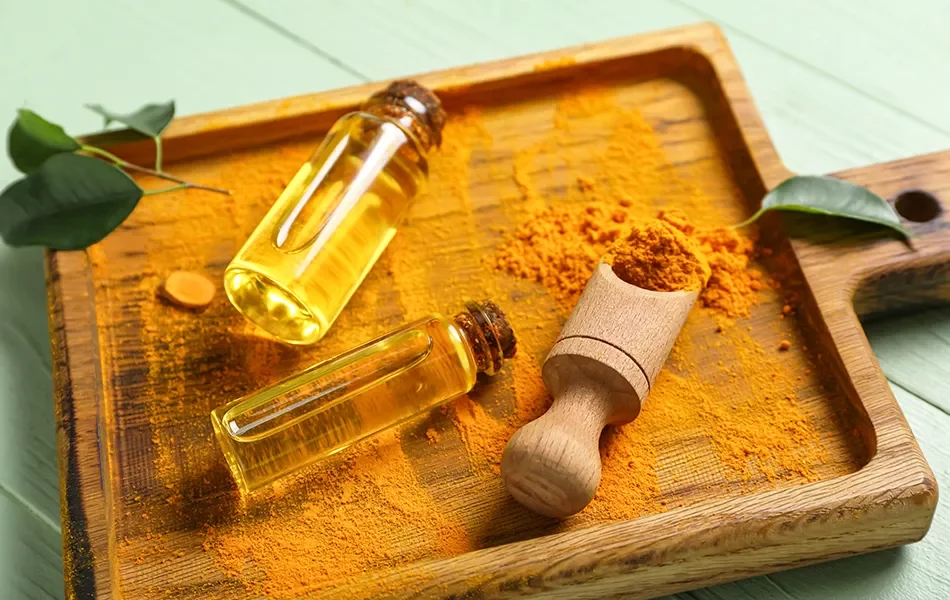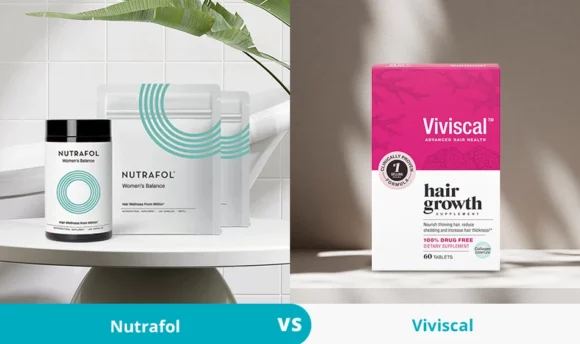Turmeric for Hair Growth: What the Science Says
Is turmeric, a widely used herbaceous plant, scientifically linked to better hair growth?

Have you tried multiple products to reduce hair loss, but none of them seemed to show results? Are you looking for natural, body-friendly ways to stimulate hair growth?
Fortunately, there is an ingredient that has been gaining popularity for its potential to promote hair growth – turmeric. Used for centuries in traditional medicine for its health benefits, this herb is now associated with positive scalp health effects.
Learn what the science says about turmeric and its potential to stimulate hair growth.
Turmeric for Hair Growth: More Than Just a Spice?
Turmeric is linked with better scalp skin health, fighting dandruff, and controlling skin oils. The anti-inflammatory properties of turmeric seem to reduce inflammation, soothe the skin, and promote natural skin rejuvenation.
Scalp health is the essential component for protecting hair follicles from environmental damage and, therefore, stimulating hair growth.
What Is Turmeric?
Turmeric is a herbaceous plant in the ginger family. It has been used for centuries in traditional Ayurvedic and Chinese medicine to treat many conditions, including inflammation, digestive issues, and skin problems.
Turmeric’s active ingredient is curcumin which is responsible for its bright yellow color and many wellness benefits. Research suggests curcumin can help to reduce inflammation, have antioxidant properties, and improve skin health.
During the last few decades, turmeric has become a popular ingredient in skin and haircare products and supplements. You can now find turmeric in many hair treatment products like shampoos, masks, and treatment oils.
That is because the turmeric plant is seen as a natural remedy to fight hair loss and help people with thinning hair.
4 Main Benefits of Turmeric for Hair Growth
#1 Promotes hair growth
There are lots of benefits to using turmeric for hair growth.
The turmeric plant has been shown to promote hair growth by stimulating blood circulation in the scalp. The increased circulation brings more nutrients and oxygen to hair follicles, which can help them grow stronger and healthier.
Besides, the anti-inflammatory and anti-microbial properties of turmeric create the ideal scalp conditions for hair health, density, and thickness.
#2 Improves scalp health
Turmeric has anti-inflammatory properties that can help soothe and heal a dry, itchy, or inflamed scalp. It can also help fight dandruff and other scalp conditions (that interfere with hair growth).
Studies have confirmed that turmeric can assist people with rashes, scaling, and other scalp psoriasis symptoms. It is shown to soothe the scalp, relieve symptoms and improve skin condition.
Therefore, turmeric is a beneficial haircare ingredient for people with easily irritated and sensitive scalp skin.
#3 Reduces inflammation
Chronic inflammation can damage hair follicles and contribute to hair loss. Turmeric’s anti-inflammatory properties can reduce inflammation, improve scalp skin health, and help hair to grow.
In addition, turmeric is rich in antioxidants, which can help protect your scalp from environmental damage. The anti-microbial properties help to control scalp oiliness, reduce the growth of microorganisms, and supercharge overall hair health.
#4 Protects hair
Turmeric contains antioxidants that can protect hair from free radical damage, which can cause hair to become brittle, weak, and prone to breakage.
It has also been found to have photoprotective properties, meaning that turmeric can protect the hair (and skin) from damage caused by exposure to UV radiation from the sun and other environmental factors.
Side Effects of Turmeric
Turmeric is generally considered safe when used orally and on the skin (when used in recommended amounts – up to 1.5g daily for up to 9 months).
However, some people may experience side effects when consuming it in large amounts. These side effects can include stomach upset, nausea, diarrhea, and headaches. Some people can also experience skin allergic reactions – contact dermatitis or hives.
If you experience severe side effects, consult a healthcare provider. If you are pregnant, breastfeeding, or taking medication, it is best to talk with a doctor before including turmeric in your diet or haircare routine.
Note: Never consume turmeric if you are taking medications known to stow blood clotting (for instance, ibuprofen and aspirin). Due to natural turmeric properties to slow down blood clotting, combining it with medications could lead to internal bleeding.
How to Use Turmeric for Hair Growth
Use turmeric to stimulate hair growth and enjoy thicker, shinier, and healthier hair. There are multiple ways you can introduce turmeric to your haircare routine – taking it orally or applying it on the scalp.
#1 Turmeric mask
Although you can always buy a mask that contains turmeric, a more budget-friendly and safer option is to prepare a DIY turmeric mask.
Mix turmeric powder with water, coconut, or olive oil in equal parts to make a paste. Apply the paste to your scalp and hair, and leave it on for 15–30 minutes before rinsing it off with lukewarm water (and shampoo, if you used oil). Add a few drops of CBD oil for an even better effect.
Additionally, you can add a tablespoon of honey to make the hair mask more moisturizing.
This hair mask immediately soothes the scalp, stimulates blood flow, and helps your hair shine.
#2 Turmeric shampoo
Look for a shampoo that includes turmeric as the ingredient. Of course, pick an overall hair-friendly shampoo – paraben, sulfate, and silicone-free.
If you have a shampoo that your hair tolerates perfectly, do not switch. Instead, add a tablespoon of powdered turmeric to your regular shampoo to create a turmeric-infused product.
Use the shampoo as you normally would, and allow it to sit on your hair for a few minutes before rinsing it off. This can help reduce dandruff, slow down hair loss processes, and protect your hair against environmental damage.
#3 Turmeric supplements
In addition to applying turmeric topically, you can also take turmeric supplements and enrich your body with the health benefits of turmeric.
Currently, there are many ways you could take turmeric orally – it depends on your preference.
If you want to follow Ayurvedic medicine, drink turmeric powder mixed with water. Alternatively, you can take turmeric in capsule form. This way, you will not feel the taste but benefit from healing properties.
Turmeric supplements provide antioxidant support against the damage caused by free radicals and help reduce inflammation throughout the body – all you need to promote hair growth.
#4 Turmeric milk
Turmeric milk (also referred to as Golden Milk) is a nourishing Indian drink made with milk, turmeric, and other spices (like cinnamon). You can follow an original recipe or simply add some powdered turmeric to warm milk.
If you drink it before going to bed, turmeric milk can also help you improve the quality of your sleep. A good night’s rest is essential to promote quicker hair growth and improve well-being.
You can also try out a currently trending turmeric latte. This original drink from Ayurvedic medicine is now witnessing its golden era in the Western world.
#5 Adding turmeric to your diet
Of course, you can simply use more turmeric in your diet and enrich your body with the needed microelements from within. Turmeric is frequently used in soups, stews, curries, and rice dishes.
Google some recipes with turmeric and consume more of what’s beneficial to your hair, skin, and body. Adding turmeric powder to your cooking adds flavor and supports your hair growth.
FAQs
Use turmeric on your hair once or twice a week. Give it some time to reveal its effectiveness (usually takes around 4–8 weeks).
One common misconception raises the question of whether turmeric can kill hair follicles and cause hair loss.
While turmeric is used in some hair removal procedures to remove hair from the skin, it doesn’t cause hair loss. Contrarily, it stimulates blood flow and hair growth.
Yes, it is considered safe to up turmeric powder in your hair. Mix the powder with olive oil and apply it as a mask for better absorption.
A Word From a Trichologist
Turmeric is an effective spice that can assist people in combating hair loss and improving the condition of their scalp.
The active compound in turmeric, curcumin, has been scientifically shown to have anti-inflammatory and antioxidant properties, which can help promote a healthy scalp and follicles.
The early-stage studies of curcumin also show a notable positive impact on male pattern hair loss (also known as androgenic alopecia). Although we still need to wait for conclusive evidence, curcumin seems like a promising aid for helping men treat male pattern baldness.
The best part is that turmeric is considered a safe plant and, if taken in recommended dosages, rarely causes any side effects.
That being said, people who experience thinning hair should incorporate turmeric into their haircare routine and diet since it can be a natural and effective way to treat hair loss.
Conclusion
The anti-inflammatory and antioxidant properties of curcumin (the active compound in the turmeric plant) can help to soothe the scalp, reduce dandruff, and improve overall hair health. Adding turmeric to your diet can provide your body with essential vitamins and minerals needed for strong and healthy hair.
You can take turmeric in a powder form, applied topically as a mask, use turmeric-enriched shampoos, or take it orally as supplements. Whatever method you choose, you should soon experience positive benefits for your hair health.

















































 Select your language:
Select your language: 








